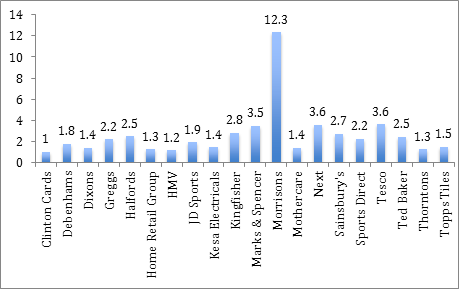How to avoid the next retail casualty
With Clinton Cards joining the list of high street retail disasters, how can you avoid investing in the next casualty? Phil Oakley explains one good way of spotting trouble ahead.
Get the latest financial news, insights and expert analysis from our award-winning MoneyWeek team, to help you understand what really matters when it comes to your finances.
You are now subscribed
Your newsletter sign-up was successful
Want to add more newsletters?

Twice daily
MoneyWeek
Get the latest financial news, insights and expert analysis from our award-winning MoneyWeek team, to help you understand what really matters when it comes to your finances.

Four times a week
Look After My Bills
Sign up to our free money-saving newsletter, filled with the latest news and expert advice to help you find the best tips and deals for managing your bills. Start saving today!
This week, Clinton Cards joined the growing list of high street casualties. The latest big name retail implosion comes just a few weeks after Game Group ran out of luck.
So how can investors spot the next potential collapse? One vital safety check we've mentioned before is to look at the ability of retailers to pay their fixed charges mainly debt interest and rent payments.
Given that lots of retailers on the UK high street rent rather than own their stores, this seems like a sensible metric to look at. So how do you calculate it?
MoneyWeek
Subscribe to MoneyWeek today and get your first six magazine issues absolutely FREE

Sign up to Money Morning
Don't miss the latest investment and personal finances news, market analysis, plus money-saving tips with our free twice-daily newsletter
Don't miss the latest investment and personal finances news, market analysis, plus money-saving tips with our free twice-daily newsletter
The good news is that it's pretty straightforward. You can get the figures you need from the annual report. The key number for rental expenses (or operating lease charges) is usually found in the notes section to the accounts.
For example, if a company has operating profits of £100m and lease payments of £25m, then it has profits before leases/rents of £125m. Let's say it has interest payments on its debts of £10m as well.
So it has £125m of profits, to cover £35m in fixed charges. The fixed charge cover (125/(25+10)) is therefore 3.6 times.
This is a pretty healthy number and tells you that the company is probably in not in any imminent danger getting into financial difficulties.
What sort of level is a red flag? Depending on the type of business a company is in, a fixed charge cover of below 1.5 times may be a sign of danger.
UK retailers fixed charge cover

We have calculated the fixed charge covers for most of the UK quoted retail sector. As you can see in the chart above, Clinton Cards was an obvious candidate for distress. But who else should we worry about?
Companies whose sales are under pressure from the internet are prime candidates. Judging from the chart above, we have come up with the following danger list:
Dixons (1.4)
HMV (1.2)
Home Retail Group (1.3)
Mothercare (1.4)
Thorntons (1.3)
Topps Tiles (1.5)
To be clear, this is not a prediction that any of these companies is going to go to the wall. But we wouldn't be keen to invest.
What about the property impact?
The other problem with high street chains suffering is you end up risking lots of empty properties, which means that landlords will face the prospect of not getting paid.
The problem is that it's difficult to find out who actually owns the high street a problem cited by Mary Portas in her recent review of the area. Most of the quoted UK property companies have exposure to more resilient shopping centres, so their risk looks quite low for now.
Our gut feeling is that many of the UK banks may be exposed here which seems like another reason to avoid them as investments.
Get the latest financial news, insights and expert analysis from our award-winning MoneyWeek team, to help you understand what really matters when it comes to your finances.
Phil spent 13 years as an investment analyst for both stockbroking and fund management companies.
-
 How a ‘great view’ from your home can boost its value by 35%
How a ‘great view’ from your home can boost its value by 35%A house that comes with a picturesque backdrop could add tens of thousands of pounds to its asking price – but how does each region compare?
-
 What is a care fees annuity and how much does it cost?
What is a care fees annuity and how much does it cost?How we will be cared for in our later years – and how much we are willing to pay for it – are conversations best had as early as possible. One option to cover the cost is a care fees annuity. We look at the pros and cons.